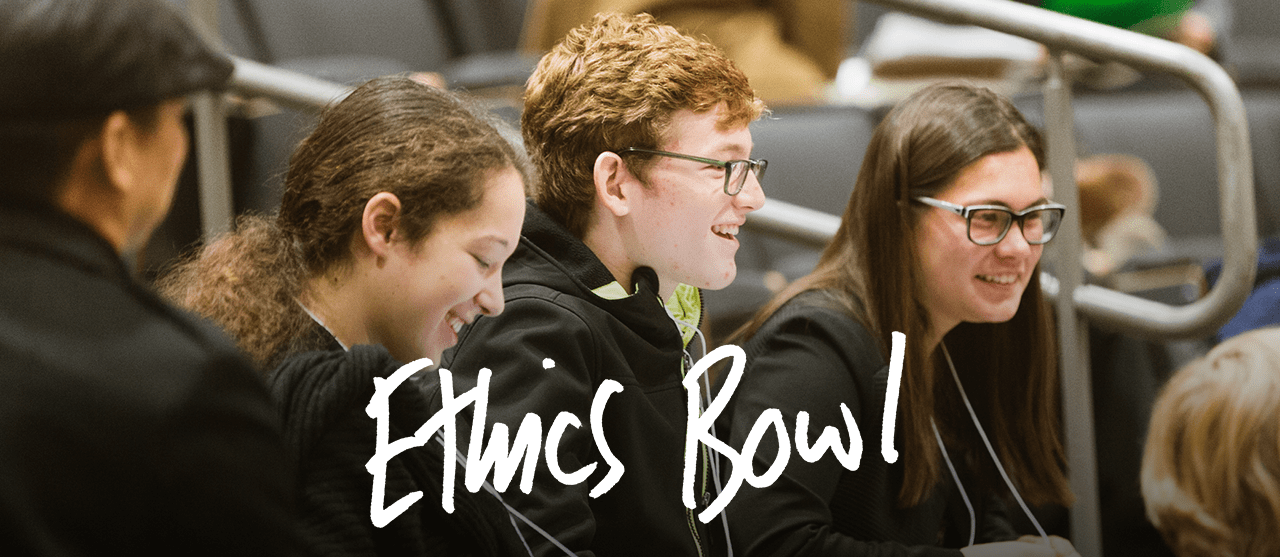

Show More
Most traditional debate formats can unfortunately fortify that kind of reasoning. In those competitions (Lincoln Douglas, Policy Debate, Public Forum, etc.) teams are randomly assigned positions–Team A, you’ll be arguing in the Affirmative, Team B, you’re arguing Negative—and their goal is to use reason to defend whatever conclusion they’ve been given.
It’s reasoning with an agenda.
Ethics Bowl is altogether different. Teams aren’t assigned positions; rather, they defend whatever they believe after they’ve thought long and honestly about it. Ethics Bowl is less about persuasion and rhetoric, and more about truth, inquiry, and intellectual honesty.

Show More
Recent cases have concerned contraception, lying to help a friend out of a tough spot, racism, family disagreements, religious freedom, video games, gun control, and much more.
Here’s one example:
Is it morally permissible to listen to a musical artist whose music you love if you find out he holds strong racist beliefs?
The more engaging the cases, the more invested the students are, and the more deeply they develop critical abilities to think, reason, and communicate productively with others

Show More
But when we disagree is when we’re most likely to get irritated, hasty, even emotional—especially when the matter is ethical, political, or personal.
The more at stake in the conversation, the more difficult it is to remain poised, clear-headed, and ready to acknowledge fair points.
Disagreeing is a skill—one of the most difficult and important out there. And cultivating it is one of the paramount goals of the Ethics Bowl. The rules of Ethics Bowl are designed to reward the most productive kind of disagreement.
Here too Ethics Bowl provides a welcome alternative to other debate formats. For a great Radiolab episode on the National Debate Organization, listen to this podcast specifically the section starting at 10:42 and ending 11:05:

Show More
camaraderie, and collaboration. It’s welcoming and encouraging—not polarizing or antagonistic.
How Does it Work?
Teams of up to five high school students spend the Fall semester developing their thinking on 15 real-world ethical questions (“cases”), which are released in early September by the National High School Ethics Bowl organization. (Here is the library of past cases.)
In the Winter, each team participates at a regional tournament (“bowl”). The team that wins–that has displayed the most clarity, depth, and open-mindedness in their thinking according to the scoring rubric–goes on to represent their region at the National Bowl in the Spring, held at the University of North Carolina, Chapel Hill.
Put a team together!
It’s easy to form a team. You just need three things:
1. Three or more high school students
2. A coach
3. An Ethics Bowl in your region
Finding a coach
Do you know a teacher at your school who likes to reason and discuss things from lots of different angles? They might love to help start a team at your school. All kinds of teachers coach Ethics Bowl (history, English, computer science, and more). Coaches don’t need a background in philosophy or ethics.
Or if you can’t find a teacher at your school, ask your local university Philosophy Department if they’d provide one.
Joining a regional
Check here to find a regional near you.
If there’s no regional in your area, start your own! Send an email to ethicsbowl@unc.edu
Resources
Here is a list of informational links to help you discover and learn more.
- National High School Ethics Bowl page
- List of regional competitions
- Northern California regional HSEB at UC Santa Cruz
- How Ethics Bowl works
